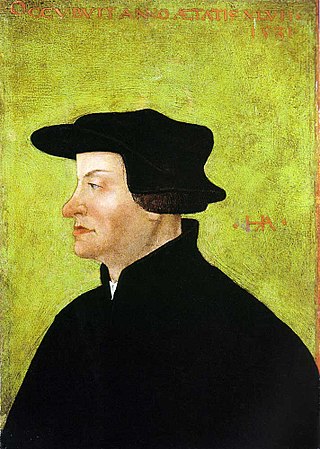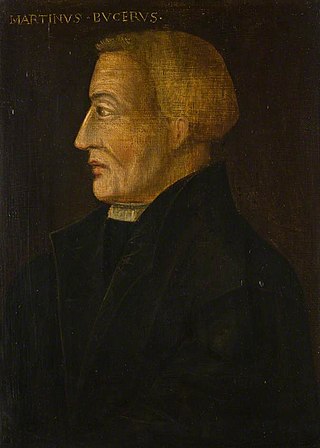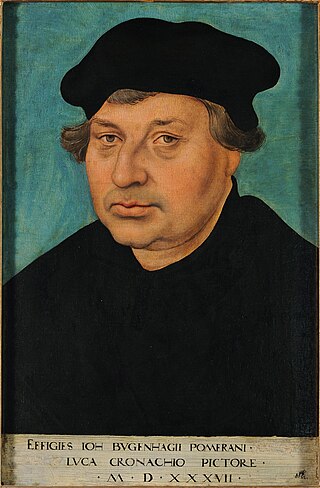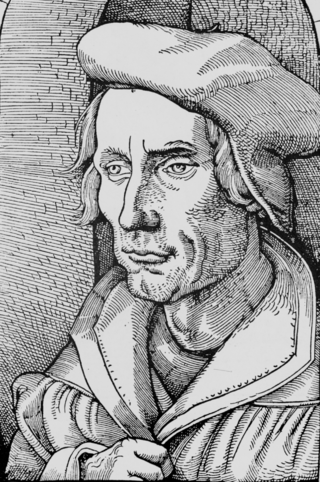
Thomas Wyttenbach (c.1472; after 21 September 1526) was one of the reformers of the city of Biel, Switzerland, during the Protestant Reformation.

Thomas Wyttenbach (c.1472; after 21 September 1526) was one of the reformers of the city of Biel, Switzerland, during the Protestant Reformation.
Wyttenbach was born in Biel. He studied liberal arts and theology at the University of Tübingen from 1496 to 1504. He was awarded a Baccalaureus (Bachelor's) degree in 1498, a Magister artium (Master of Arts) in 1500, and an apprentice professor (Baccalaureusbiblicus; Bachelor of Theology in Biblical Studies) in 1504. In 1505, he moved to the University of Basel, where he worked as Sententiarius. Among his students were Ulrich Zwingli and Leo Jud. In 1507, he became a priest at St Benedict's City Church in Biel. In parallel, Wyttenbach continued his studies and received a Doctor in Theology in 1515. [1]
In the years 1515 to 1520, in addition to his position in Biel, Wyttenbach served as canon (custodian) at the Collegiate Church St. Vincent (Bern Minster) in Bern. From 1520, he worked in Biel until his death.
In the early summer of 1523, Wyttenbach rejected the doctrine of transubstantiation in an exchange of letters with Ulrich Zwingli. Zwingli's reply to Wyttenbach was sent on June 15, 1523.
Wyttenbach married in the summer of 1524 (name of wife unknown), which is why he was dismissed from his sinecure at the City Church. He continued to preach at the commandery of the Order of Saint John in Biel.
In Biel, a street (Thomas-Wyttenbach-Strasse) and a building of the protestant parish is named after him.

Huldrych or Ulrich Zwingli was a leader of the Reformation in Switzerland, born during a time of emerging Swiss patriotism and increasing criticism of the Swiss mercenary system. He attended the University of Vienna and the University of Basel, a scholarly center of Renaissance humanism. He continued his studies while he served as a pastor in Glarus and later in Einsiedeln, where he was influenced by the writings of Erasmus.

Martin Bucer was a German Protestant reformer based in Strasbourg who influenced Lutheran, Calvinist, and Anglican doctrines and practices. Bucer was originally a member of the Dominican Order, but after meeting and being influenced by Martin Luther in 1518 he arranged for his monastic vows to be annulled. He then began to work for the Reformation, with the support of Franz von Sickingen.

Heinrich Bullinger was a Swiss Reformer and theologian, the successor of Huldrych Zwingli as head of the Church of Zürich and a pastor at the Grossmünster. One of the most important leaders of the Swiss Reformation, Bullinger co-authored the Helvetic Confessions and collaborated with John Calvin to work out a Reformed doctrine of the Lord's Supper.

Johannes Oecolampadius was a German Protestant reformer in the Calvinist tradition from the Electoral Palatinate. He was the leader of the Protestant faction in the Baden Disputation of 1526, and he was one of the founders of Protestant theology, engaging in disputes with Erasmus, Huldrych Zwingli, Martin Luther and Martin Bucer. Calvin adopted his view on the Eucharist dispute.

Ulrich von Hutten was a German knight, scholar, poet and satirist, who later became a follower of Martin Luther and a Protestant reformer.

Johannes Bugenhagen, also called Doctor Pomeranus by Martin Luther, was a German theologian and Lutheran priest who introduced the Protestant Reformation in the Duchy of Pomerania and Denmark in the 16th century. Among his major accomplishments was organization of Lutheran churches in Northern Germany and Scandinavia. He has also been called the "Second Apostle of the North".

Andreas Rudolph Bodenstein von Karlstadt, better known as Andreas Karlstadt, Andreas Carlstadt or Karolostadt, in Latin, Carolstadius, or simply as Andreas Bodenstein, was a German Protestant theologian, University of Wittenberg chancellor, a contemporary of Martin Luther and a reformer of the early Reformation.

Leo Jud, known to his contemporaries as Meister Leu, was a Swiss reformer who worked with Huldrych Zwingli in Zürich.
Ambrosius Blarer was an influential Protestant reformer in southern Germany and north-eastern Switzerland.

Valerius Anshelm, born as Valerius Rüd, was a Swiss chronicler working in Bern.

Joachim Vadian, born as Joachim von Watt, was a humanist, scholar, mayor and reformer in the free city of St. Gallen.

Bern Minster is a Swiss Reformed cathedral in the old city of Bern, Switzerland. Built in the Gothic style, its construction started in 1421. Its tower, with a height of 100.6 m (330 ft), was only completed in 1893. It is the tallest cathedral in Switzerland and is a Cultural Property of National Significance.

Otto Brunfels was a German theologian and botanist. Carl von Linné listed him among the "Fathers of Botany".

Paul Fagius was a Renaissance scholar of Biblical Hebrew and Protestant reformer.
The Swiss Brethren are a branch of Anabaptism that started in Zürich, spread to nearby cities and towns, and then was exported to neighboring countries. Today's Swiss Mennonite Conference can be traced to the Swiss Brethren.

Sebastian Hofmeister, known in writing as Oeconomus or Oikonomos, was a Swiss monk and religious Reformer who was prominent in early debates of the Reformation.

The theology of Ulrich Zwingli was based on an interpretation of the Bible, taking scripture as the inspired word of God and placing its authority higher than what he saw as human sources such as the ecumenical councils and the church fathers. He also recognised the human element within the inspiration, noting the differences in the canonical gospels. Zwinglianism is the Reformed confession based on the Second Helvetic Confession promulgated by Zwingli's successor Heinrich Bullinger in the 1560s.

Berchtold Haller was a German Protestant reformer. He was the reformer of the city of Bern, Switzerland, where the Reformation received little to none opposition.
The following outline is provided as an overview of and topical guide to Protestantism:
The Bern Disputation was a debate over the theology of the Swiss Reformation that occurred in Bern from 6 to 26 January 1528 that ended in Bern becoming the second Swiss canton to officially become Protestant.